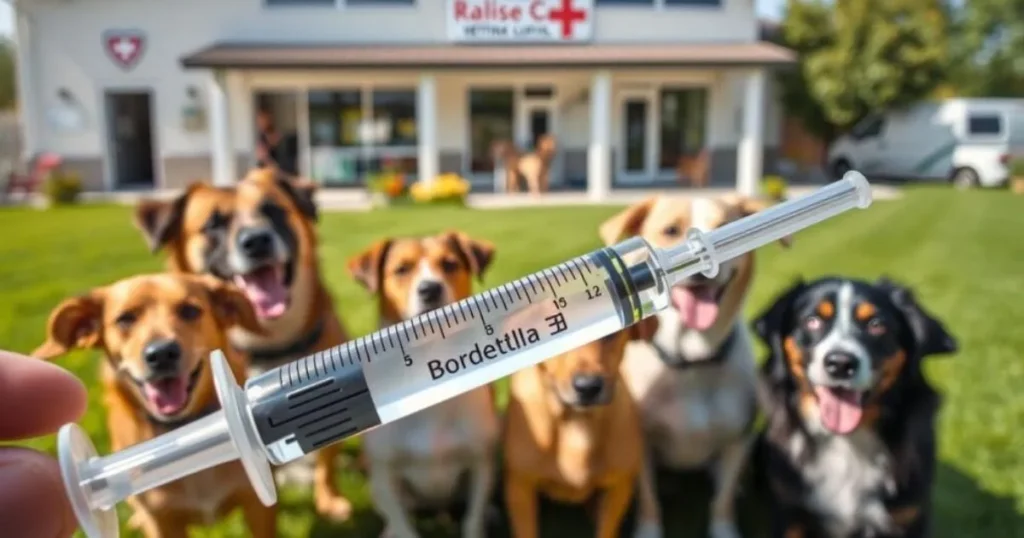As a dedicated dog owner, your pet’s health is your top priority. The Bordetella vaccine for dogs is essential for shielding them from kennel cough. This guide explains its importance, how it’s administered, and how it helps keep your dog safe and healthy.
Bordetella bronchiseptica causes kennel cough, a serious infection for dogs. Knowing about its causes, symptoms, and risks helps you decide if your dog needs the vaccine.
The Bordetella vaccine is highly effective in preventing kennel cough. It can be given in different ways, like orally, nasally, or by injection. Understanding these options helps you choose the best vaccine for your dog with your vet.
Understanding Kennel Cough and Its Causes
Kennel cough, also known as Bordetella bronchiseptica, is a contagious respiratory illness in dogs. It is triggered by viruses and bacteria, such as Bordetella bronchiseptica and the canine parainfluenza virus. This illness spreads fast in dog-friendly places, like parks, kennels, and daycare.
Symptoms of Kennel Cough
The main sign of kennel cough is a “honking” cough. Dogs may also gag, sneeze, have nasal discharge, feel tired, eat less, and have a fever. These symptoms start 2 to 14 days after a dog is exposed.
How Kennel Cough Spreads
Kennel cough spreads easily through contact, air, or surfaces. Dogs with kennel cough are contagious.It’s advisable to keep them separated from other dogs for a minimum of two weeks.
Risk Factors for Dogs
Some factors make dogs more likely to get kennel cough. These include:
- Being around many dogs, like in parks or daycare
- Having narrow airways, common in breeds like English Bulldogs
- Having a weak immune system, like puppies or older dogs
Vaccines can help, but they’re not 100% effective. Vaccinated dogs usually have milder symptoms. If a dog gets pneumonia, they might need hospital care, fluids, antibiotics, and oxygen.
“Kennel cough is highly contagious and spreads rapidly through airborne droplets, direct contact, or contaminated surfaces in places where dogs congregate.”
What is the Bordetella Vaccine
The Bordetella vaccine helps prevent kennel cough, a contagious illness in dogs. It can be given in different ways, like orally, through the nose, or under the skin. Even though it’s very effective, it’s not 100% safe.Infections can still arise from other viruses and bacteria.
To protect dogs even more, the Bordetella vaccine is often mixed with parainfluenza virus vaccines. Puppies get their first Bordetella vaccine when they are 6 to 8 weeks old. They need booster shots throughout their life to keep fighting off Bordetella bronchiseptica, the bacteria that causes kennel cough.
Bordetella Vaccine Cost and Availability
The Bordetella vaccine usually costs about $30.Costs may vary depending on your location. Getting Bordetella, rabies, and DHPP vaccines together can cost over $100. But, programs like the Pumpkin Wellness Club can give you up to $150 back on pet vaccines each year. This helps make the cost easier to handle.
Bordetella Vaccine Administration
- The Intranasal Bordetella vaccine usually requires booster doses every 6 to 12 months.
- The Injectable Bordetella vaccine may need to be administered once every 1 to 3 years.
Vaccinated dogs can still get kennel cough if they meet the Bordetella bronchiseptica bacteria. But, their symptoms are likely to be milder. It’s important to keep up with regular Bordetella booster shots. This is especially true for dogs that often meet other pets, like at dog parks or daycare centers.
“The Bordetella vaccine is classified as a non-core vaccine for dogs and cats that regularly interact with other pets in settings such as daycare centers, boarding kennels, pet shows, dog parks, training sessions, and grooming facilities.”
The Bordetella vaccine is key for keeping pets healthy. It helps protect them from the serious effects of kennel cough.
Types of Bordetella Vaccine Administration
The Bordetella vaccine is key to keeping your dog safe from respiratory diseases. It comes in different forms, each with its own benefits and things to consider. This lets you pick the best one for your dog.
Intranasal Vaccination
The intranasal Bordetella vaccine is a spray that goes right into your dog’s nose. It works fast to protect the upper respiratory system. But, it might not work as well for dogs already exposed to Bordetella.
Injectable Vaccination
The injectable Bordetella vaccine is administered as a subcutaneous shot. It’s a traditional choice but might cause some soreness at the injection site.
Oral Vaccination Options
The Bronchi-Shield Oral vaccine is a new option approved by the USDA for dogs. It’s a convenient way to prevent respiratory disease. It’s a good choice for pet owners looking for an easy option.
Every Bordetella vaccine type is important for keeping your dog healthy. consult your vet to find the best one for your dog’s needs and history.
Vaccination Schedule and Timing
Getting your dog the right dog vaccination schedule is key for their health and safety. The veterinary immunization plan for the Bordetella vaccine depends on your dog’s age and risk level.
Puppies can get the intranasal Bordetella vaccine as young as 3 weeks old. They need a second dose four weeks later. For the injectable version, puppies get their first shots at 6 to 8 weeks old. Then, they get a booster at 10 to 12 weeks.
Adult dogs usually need a Bordetella booster shot every year. But, dogs at high risk might need it every 6 months. The intranasal vaccine protects for at least a year. The injectable and oral vaccines protect for a bit less time.
“Skipping or delaying a vaccine can weaken a dog’s immunity, particularly in puppies who require a series of vaccinations during their first year to develop strong protection.”
It’s vital to work with your vet to find the best dog vaccination plan for your dog. Consider their age, lifestyle, and risk of exposure. This ensures they get the protection they need.
Side Effects and Safety Considerations
The Bordetella vaccine for dogs is typically safe, but some dogs may experience mild side effects. It’s important to be aware of these to ensure your dog’s safety and well-being.
Common Reactions
Some dogs might get:
- Nasal discharge (for intranasal vaccines)
- Soreness at the injection site
- Low-grade fever
- Fatigue
- Loss of appetite
These symptoms typically subside within a few days. However, if they persist or worsen, consult your vet.
When to Contact Your Veterinarian
Though rare, some dogs might have serious reactions. These include:
- Vomiting
- Diarrhea
- Difficulty breathing
If your dog shows these signs, call your vet right away. Taking prompt action is crucial for your dog’s health.
Precautions for Special Cases
Pregnant or nursing dogs should talk to their vet before getting the bordetella vaccine. Your vet can help weigh the risks and benefits for your dog’s health and any puppies.
The bordetella vaccine is mostly safe for dogs. But, knowing about possible side effects and talking to your vet is important. This helps keep your dog healthy and happy.
Cost and Availability of Bordetella Vaccines
Protecting your dog from kennel cough is key. The Bordetella vaccine is essential for their health. But, the price and where to get it can change a lot.
The Bordetella vaccine costs between $19 and $60 per dose. Most people pay about $30. You might also pay extra for an exam and medical records, making the total cost $35 to $95.
The price of the vaccine varies by region. In the Northeast, it’s $30 to $40. In the Southeast, it’s $25 to $35. On the West Coast, it’s $30 to $45. In the Midwest and Southwest, it’s $25 to $35.
Looking for cheaper options? Low-cost clinics and community events can save you 30-50%. Pet stores and feed stores also offer lower prices, 30-40% less than vets.
The Bordetella vaccine is easy to find. But, the type of vaccine depends on your dog’s life and preferences. Your vet will choose the best one for your dog.
| Region | Bordetella Vaccine Cost Range |
|---|---|
| Northeast | $30 – $40 |
| Southeast | $25 – $35 |
| West Coast | $30 – $45 |
| Midwest | $25 – $35 |
| Southwest | $25 – $35 |
Knowing the cost and where to get the Bordetella vaccine helps. It ensures your dog stays safe from kennel cough. This is a common but serious illness.

Which Dogs Need the Vaccine
The bordetella vaccine is key for dogs that are very social or often meet other dogs. This includes dogs that go to dog parks, training classes, shows, or stay in boarding facilities or doggie daycares. Many places need to see your dog’s bordetella vaccination before they can enter.
However, dogs that don’t meet many other dogs or stay inside a lot might not need this vaccine. It’s best to talk to your vet about your dog’s life and risks.
- Dogs that often go to dog parks or join group training classes should get the bordetella vaccine.
- Pups in boarding facilities or doggie daycares usually need to show they’ve had the dog vaccination for bordetella.
- Dogs that don’t meet many other dogs or stay inside mostly might not need the bordetella vaccine.
Whether your dog needs the bordetella vaccine depends on their life. Talking to your vet about your dog’s lifestyle helps decide the best way to keep them healthy.
Conclusion
The bordetella vaccine is key in stopping kennel cough and keeping dogs healthy. It doesn’t offer full protection but lowers the risk of respiratory infections. It’s vital to talk to your vet about the right vaccination schedule for your dog.
Regular shots and other preventive steps are crucial for your dog’s health. This way, you can ensure your dog stays healthy for a long time.
Research shows the canine respiratory protection the bordetella vaccine offers is beneficial. The acellular pertussis (aP) vaccine is more effective than the whole-cell pertussis (wP) vaccine. Also, a new vaccine has shown great results in mice, making them immune to Bordetella pertussis.
Even though the vaccine is effective, it’s important to keep up with the latest information. Always consult with your vet to decide what’s best for your dog. By using the bordetella vaccine, you can protect your dog’s health and give them a happy life.
